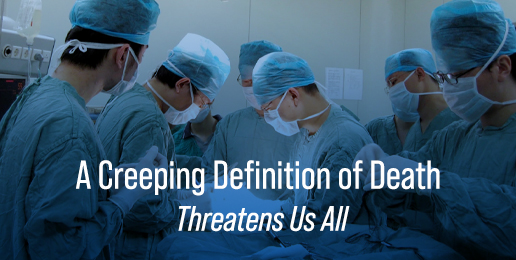
The juxtaposition of worldviews was shocking.
On July 21, U.S. Department of Health and Human Services (HHS) Secretary Robert F. Kennedy, Jr. announced a plan to restructure the organ transplant system in the United States following an investigation that revealed a “systemic disregard for the sanctity of life” by a major organ procurement organization.
A mere nine days later, the New York Times published an op-ed titled, Donor Organs Are Too Rare. We Need a New Definition of Death. (If you can’t access the NYT article, Townhall has a quick synopsis here.) In it, the authors argue that the definition of death should expand beyond “brain death” (a disputed term invented in 1968 to increase the availability of organs for transplant) to:
“include irreversibly comatose patients on life support. Using this definition, these patients would be legally dead regardless of whether a machine restored the beating of their heart.”
This approach would drastically broaden the umbrella under which patients could be legally considered dead, even more prematurely starting the organ procurement conversation with loved ones who are grief-stricken and impressionable as they face heartbreaking circumstances.
It also does so without any thought to the cases of those who have come out of a coma after physicians believed they were beyond all hope of recovery.
What is deeply concerning about any attempts to expand the definition of death is that even now, it appears physicians are offering up for organ harvesting patients who should not be declared dead. This year, the Health Resources and Services Administration (HRSA), the sub-department of HHS that oversees organ donation in the U.S., launched an investigation into organ procurement practices after reopening a 2021 case of “potentially preventable harm to a neurologically injured patient” (leading to the HHS announcement).
33-year-old Anthony Thomas Hoover had suffered an overdose and was declared brain-dead, but later woke up as surgeons prepared to harvest his organs. That alone is horrifying, but it gets worse – some personnel from the procurement organization insisted the surgical team proceed with the operation “even though the man cried, pulled his legs to his chest and shook his head.”
Only when the staff became uncomfortable and a doctor refused to remove life support was Hoover’s life saved.
In the case of patients who are under the influence of a substance, signs of brain death appear to be unreliable, as they can be temporary and linked to intoxication. In other words, as a patient’s body clears the substance, as in the case of Mr. Hoover, some patients no longer fit the definition of brain death.
According to the HRSA’s report, which reviewed the electronic medical records of several hundred patients for whom organ donation was authorized but not completed, Hoover’s was not an isolated case.
At the time of the HHS announcement, Sec. Kennedy said on X:
“Our findings show that hospitals allowed the organ procurement process to begin when patients showed signs of life, and this is horrifying. The organ procurement organizations that coordinate access to transplants will be held accountable. The entire system must be fixed to ensure that every potential donor’s life is treated with the sanctity it deserves.”
This revealing moment in our cultural history pulls back the curtain on just how utilitarian our medical complex has become.
Not only are medical professionals and organ procurement organizations (OPOs) making a pragmatic, cold choice concerning whether the donor or the recipient is more “worthy” of being saved, but they are apparently also doing so based on flawed science and their own biased interpretations of the likelihood of meaningful recovery on the part of the intended donor.
While there are probably many physicians and OPO staff whose hearts are in the right place, we cannot discount the role money plays here, either.
It isn’t cynical to recognize that there is money to be made from a successful transplant. Whenever money is tied to a priceless resource like human organs, we will see the commodification (and the discarding) of human life. And whether individual staff members care more for human life than for money, OPOs are certainly capable of turning a blind eye when protocols are not followed (as was the case here).
Perhaps what is most clearly shown by the Times article/HHS disagreement is that we as a society have largely lost our way concerning the sanctity of life, the worthiness of life in the face of suffering, and hope for eternity.
Only in a culture that elevates radical personal autonomy as the highest good do we end up with people who:
- Argue for an expanded definition of death to save more lives by killing others
- Believe that the suffering faced by those who recover from a trauma or other brain injury may justify a sort of “mercy killing” in the form of the removal of life support for organ procurement
- React with outrage when a hospital keeps a brain-dead mother on life support to allow for the delivery of her innocent, unborn baby (cue Handmaid’s Tale references and cries of forced pregnancy)
Incoherence isn’t a strong enough word for what we are seeing – when we lack a moral foundation that stands on the transcendent Word of God, we take crucial, life-threatening stands on thin air.
In a truly Brave New World-esque development, this March, the MIT Technology Review published an article entitled “Ethically sourced ‘spare’ human bodies could revolutionize medicine.”
In it, the three authors suggest that the solution to long waits for cures, drug approvals, and organs for transplantation lies in the creation of “bodyoids,” human bodies grown in a lab for the sole purpose of being experimented on and to supply tissues or organs. They say,
“Recent advances in biotechnology now provide a pathway to producing living human bodies without the neural components that allow us to think, be aware, or feel pain.”
The authors admit many might find this suggestion grotesque, acknowledging that the suggestion that we would subject any human being of any level of consciousness to these kinds of procedures and experimentation is appalling to most. But just a few paragraphs later, they admit scientists and doctors:
“have even begun using for experiments the ‘animated cadavers’ of people who have been declared legally dead, who have lost all brain function but whose other organs continue to function with mechanical assistance … In all these cases, nothing was, legally, a living human being at the time it was used for research. Human bodyoids would also fall into that category.”
They later admit that the likelihood of this ever happening is small, and they acknowledge that there is no guarantee the technology would work. Regardless, that this is even an option for some of what might be regarded as the brightest minds in science is truly concerning.
Whatever the answer to the organ shortage is, this isn’t it.
No doubt these scientists and many other personnel involved in the organ procurement system in our nation believe their motives to be compassionate, but their solutions reveal a deadly shortsightedness. Most people know that treating human beings with a purely utilitarian calculus is wrong, but many cannot articulate why.
The short answer is that the sanctity of human life is written on the hearts of all God’s image bearers.
But for the heart that is not submitted to the God of the Bible, it is perfectly reasonable to commodify human bodies and body parts, to treat some lives as disposable, to place a finger on the scales and favor a “worthier” life over a less worthy one, and to extend this life for some, no matter the consequences for others.
But these questions of life and death are never that simple, and those who wish them to be so are playing a dangerous game, one that is an eternity above their pay grade.
We don’t need a new definition of death. We need a coherent one.
That can only be found through trust in the creator God who has numbered our days, and with Whom eternity will be far better than anything we could cling to here on Earth.





















